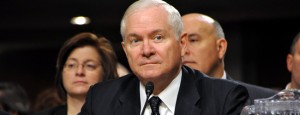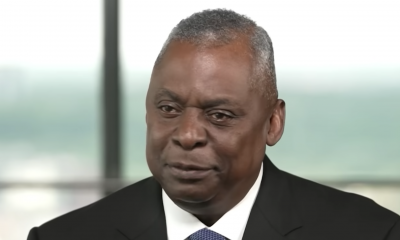National
Troop survey draws criticism
Activists assail ‘derogatory’ language in Pentagon questionnaire
A new Pentagon study that aims to gather the views of military spouses on “Don’t Ask, Don’t Tell” repeal has invoked the ire of LGBT advocacy groups that are claiming bias in the questionnaire.
According to the Defense Department, the survey went out Aug. 20 to 150,000 military households and is intended to inform the work of the Pentagon group working on a plan to end “Don’t Ask, Don’t Tell.”
“We’re going to look at that information and develop an implementation plan for a possible repeal of ‘Don’t Ask, Don’t Tell,’” said Cynthia Smith, a Defense Department spokesperson.
But LGBT rights groups advocating for repeal of “Don’t Ask, Don’t Tell” say the survey questions are biased and assume a negative impact of repealing the 1993 law banning open service in the U.S. military.
Among the survey questions:
• Has your spouse ever worked on a daily basis with an individual he or she believed to be a homosexual service member?
• Compared with other service members in the community, how much did that service member participate in military social activities?
• Would a repeal of “Don’t Ask, Don’t Tell” affect your preference for your spouse’s plans for his or her future in the military?
• Assume “Don’t Ask, Don’t Tell” is repealed and you live in on-base housing. If a gay or lesbian service member lived in your neighborhood with their partner, would you stay on-base or would you try to move out?
Alex Nicholson, executive director of the Servicemembers United, said Monday in a statement that the spousal survey was even more derogatory toward gay and lesbian personnel than a previous survey sent directly to U.S. troops.
“While it is wise to solicit and consider military spouse input on policy changes that will have a major impact on military families, it is extremely unwise to do so for issues that have minimal impact on spouses while also using poorly designed, biased and derogatory survey instruments,” Nicholson said.
Nicholson added that the Pentagon should be concerned with what he called “real family readiness issues,” such as excessive deployments, inadequate mental health support and low troop pay.
Michael Cole, a Human Rights Campaign spokesperson, said in response to a Blade inquiry on the survey that his organization doesn’t believe the survey is necessary in the first place.
“Gay and lesbian troops are serving now, albeit in silence,” Cole said. “Given that this entire process is about how, not if, to implement repeal, we look forward to the day sometime soon when all of these are non-issues to open service.”
The spousal survey comes on the heels of another survey the Pentagon issued to 450,000 troops to collect their views on eliminating “Don’t Ask, Don’t Tell.”
According to the Pentagon, only about one-quarter of those surveys were returned by their due date on Aug. 25. Smith said the Pentagon received 110,000 of the 450,000 surveys it distributed.
Nicholson said such a return rate shows troops have little interest in the survey and don’t care about changing “Don’t Ask, Don’t Tell.”
“While the Department of Defense and [survey coordinator] Westat are spinning the low response rate to the ‘Don’t Ask, Don’t Tell’ survey as expected and sufficient, neither are disclosing the fact that the military leaders have had to put significant pressure on troops on multiple occasions to even get this level of response,” Nicholson said. “Some commanders and senior leaders have even told subordinates that participation is mandatory.”
Nicholson said the limited responses degrade of the credibility of the survey and “violate ethical standards that prevent researchers from compelling respondents to participate in survey research.”
In addition to seeking input from military spouses, the Pentagon also is working with LGBT groups to find a way to obtain feedback from the same-sex partners of U.S. service members without outing those troops under “Don’t Ask, Don’t Tell.”
Smith said the Pentagon is “currently in the process” of working with advocacy groups to determine how to reach out to partners of gay and lesbian service members.
Trevor Thomas, spokesperson for the Servicemembers Legal Defense Network, said SLDN is among the groups with which the Pentagon is consulting on this matter.
“While there are legal questions and concerns around confidentiality, we’re working to find the safest approach possible and make sure their important voices are heard,” he said.
Palm Center report
shows ‘Don’t Ask’ costs
In a related development, the Palm Center, a think tank on gays in the military at the University of California, Santa Barbara, last week published a report outlining 12 “costs” of the law.
The report, titled “Don’t Ask, Don’t Tell: Detailing the Damage,” cites several ways in which the U.S. military has been harmed as a result of having the law in place for 17 years.
According to the report, “Don’t Ask, Don’t Tell” harms the armed services by:
• wasting the talents of essential personnel with critical skills who were fired for their sexual orientation, including Arabic language specialists, medical professionals and combat aviators. The report cites a Governmental Accountability Office study saying 757 troops with “critical occupations” were fired between fiscal years 1994 and 2003;
• hampering recruitment and retention by shrinking the pool of potential enlistees for the U.S. military. The report cites a study from the Williams Institute at the University of California that says 41,000 qualified gay Americans may join the U.S. armed forces if the ban on open service were lifted;
• imposing financial costs on the U.S. military. The report cites a 2005 GAO study saying “Don’t Ask, Don’t Tell” has cost the military $190.5 million: $95.4 million to recruit replacements for service members separated under the policy and $95.1 million to train them;
• wasting the time of officers who must investigate and discharge outed gay, lesbian and bisexual troops.
In a statement, Nathaniel Frank, who wrote the report as a senior fellow at the Palm Center, said the work is intended to draw new attention to the damage that “Don’t Ask, Don’t Tell” inflicts on the military.
“Much of the debate about whether to repeal ‘Don’t Ask, Don’t Tell’ has focused on the fact that the ban is unfair and unnecessary,” he said. “But there is less familiarity with the profound damage the policy causes, and so there isn’t quite the sense of urgency among some policymakers to lift the ban. This report details a long list of costs imposed by ‘Don’t Ask, Don’t Tell’, that show the policy has achieved the opposite of what it was supposed to accomplish.”
U.S. Federal Courts
Federal judge blocks Trump passport executive order
State Department can no longer issue travel documents with ‘X’ gender markers

A federal judge on Friday ruled in favor of a group of transgender and nonbinary people who have filed a lawsuit against President Donald Trump’s executive order that bans the State Department from issuing passports with “X” gender markers.
The Associated Press notes U.S. District Judge Julia Kobick in Boston issued a preliminary injunction against the directive. The American Civil Liberties Union, which represents the plaintiffs, in a press release notes Kobick concluded Trump’s executive order “is likely unconstitutional and in violation of the law.”
“The preliminary injunction requires the State Department to allow six transgender and nonbinary people to obtain passports with sex designations consistent with their gender identity while the lawsuit proceeds,” notes the ACLU. “Though today’s court order applies only to six of the plaintiffs in the case, the plaintiffs plan to quickly file a motion asking the court to certify a class of people affected by the State Department policy and to extend the preliminary injunction to that entire class.”
Former Secretary of State Antony Blinken in June 2021 announced the State Department would begin to issue gender-neutral passports and documents for American citizens who were born overseas.
Dana Zzyym, an intersex U.S. Navy veteran who identifies as nonbinary, in 2015 filed a federal lawsuit against the State Department after it denied their application for a passport with an “X” gender marker. Zzyym in October 2021 received the first gender-neutral American passport.
The State Department policy took effect on April 11, 2022. Trump signed his executive order shortly after he took office in January.
Germany, Denmark, Finland, and the Netherlands are among the countries that have issued travel advisories for trans and nonbinary people who plan to visit the U.S.
“This ruling affirms the inherent dignity of our clients, acknowledging the immediate and profound negative impact that the Trump administration’s passport policy would have on their ability to travel for work, school, and family,” said ACLU of Massachusetts Legal Director Jessie Rossman after Kobick issued her ruling.
“By forcing people to carry documents that directly contradict their identities, the Trump administration is attacking the very foundations of our right to privacy and the freedom to be ourselves,” added Rossman. “We will continue to fight to rescind this unlawful policy for everyone so that no one is placed in this untenable and unsafe position.”
State Department
HIV/AIDS activists protest at State Department, demand full PEPFAR funding restoration
Black coffins placed in front of Harry S. Truman Building

Dozens of HIV/AIDS activists on Thursday gathered in front of the State Department and demanded the Trump-Vance administration fully restore President’s Emergency Plan for AIDS Relief funding.
Housing Works CEO Charles King, Health GAP Executive Director Asia Russell, Human Rights Campaign Senior Public Policy Advocate Matthew Rose, and others placed 206 black Styrofoam coffins in front of the State Department before the protest began.
King said more than an estimated 100,000 people with HIV/AIDS will die this year if PEPFAR funding is not fully restored.
“If we continue to not provide the PEPFAR funding to people living in low-income countries who are living with HIV or at risk, we are going to see millions and millions of deaths as well as millions of new infections,” added King.
Then-President George W. Bush in 2003 signed legislation that created PEPFAR.
The Trump-Vance administration in January froze nearly all U.S. foreign aid spending for at least 90 days. Secretary of State Marco Rubio later issued a waiver that allows the President’s Emergency Plan for AIDS relief and other “life-saving humanitarian assistance” programs to continue to operate during the freeze.
The Washington Blade has previously reported PEPFAR-funded programs in Kenya and other African countries have been forced to suspend services and even shut down because of a lack of U.S. funding. Two South African organizations — OUT LGBT Well-being and Access Chapter 2 — that received PEPFAR funding through the U.S. Agency for International Development and the Centers for Disease Control and Prevention in recent weeks closed down HIV-prevention programs and other services to men who have sex with men.
Rubio last month said 83 percent of USAID contracts have been cancelled. He noted the State Department will administer those that remain in place “more effectively.”
“PEPFAR represents the best of us, the dignity of our country, of our people, of our shared humanity,” said Rose.
Russell described Rubio as “ignorant and incompetent” and said “he should be fired.”
“What secretary of state in 90 days could dismantle what the brilliance of AIDS activism created side-by-side with George W. Bush? What kind of fool could do that? I’ll tell you who, the boss who sits in the Harry S. Truman Building, Marco Rubio,” said Russell.

U.S. Military/Pentagon
Pentagon urged to reverse Naval Academy book ban
Hundreds of titles discussing race, gender, and sexuality pulled from library shelves

Lambda Legal and the Legal Defense Fund issued a letter on Tuesday urging U.S. Defense Secretary Pete Hegseth to reverse course on a policy that led to the removal of 381 books from the Nimitz Library of the U.S. Naval Academy in Annapolis, Md.
Pursuant to President Donald Trump’s executive order 14190, “Ending Radical Indoctrination in K-12 Schooling,” the institution screened 900 titles to identify works promoting “diversity, equity, and inclusion,” removing those that concerned or touched upon “topics pertaining to the experiences of people of color, especially Black people, and/or LGBTQ people,” according to a press release from the civil rights organizations.
These included “I Know Why the Caged Bird Sings” by Maya Angelou, “Stone Fruit” by Lee Lai, “The Hate U Give” by Angie Thomas, “Lies My Teacher Told Me: Everything Your American History Textbook Got Wrong” by James W. Loewen, “Gender Queer: A Memoir” by Maia Kobabe, and “Democracy in Black: How Race Still Enslaves the American Soul” by Eddie S. Glaude, Jr.
The groups further noted that “the collection retained other books with messages and themes that privilege certain races and religions over others, including ‘The Clansman: A Historical Romance of the Ku Klux Klan’ by Thomas Dixon, Jr., ‘Mein Kampf’ by Adolf Hitler, and ‘Heart of Darkness’ by Joseph Conrad.
In their letter, Lambda Legal and LDF argued the books must be returned to circulation to preserve the “constitutional rights” of cadets at the institution, warning of the “danger” that comes with “censoring materials based on viewpoints disfavored by the current administration.”
“Such censorship is especially dangerous in an educational setting, where critical inquiry, intellectual diversity, and exposure to a wide array of perspectives are necessary to educate future citizen-leaders,” Lambda Legal Chief Legal Officer Jennifer C. Pizer and LDF Director of Strategic Initiatives Jin Hee Lee said in the press release.
-

 El Salvador5 days ago
El Salvador5 days agoGay Venezuelan makeup artist remains in El Salvador mega prison
-

 State Department3 days ago
State Department3 days agoHIV/AIDS activists protest at State Department, demand full PEPFAR funding restoration
-

 Brazil4 days ago
Brazil4 days agoUS lists transgender Brazilian congresswoman’s gender as ‘male’ on visa
-

 District of Columbia5 days ago
District of Columbia5 days agoTwo charged with assaulting, robbing gay man at D.C. CVS store













